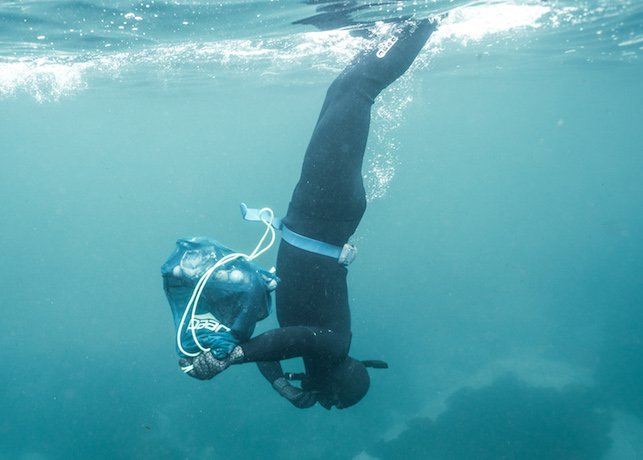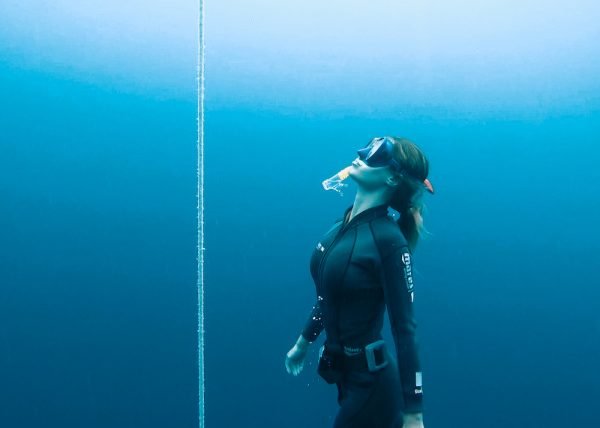5 REASONS YOU CAN’T EQUALISE FOR FREEDIVING
‘Why can’t I equalise’ is maybe the most popular question in all of freediving. I’m happy to say that you definitely, definitely are not alone. Equalisation can be an absolute bitch.
When I first started diving, equalisation problems held me back for months. I would get angry, I would cry, I would lose my breath-hold after 10 seconds and turn. I’d even try to ignore the pain and dive deeper (please don’t do this). Equalisation problems were the literal bane of my fucking life and I didn’t understand why it seemed so easy for other people.
And then, one day, it magically worked – I could equalise!
Just kidding. This didn’t happen. Actually, I practiced and practiced until it worked. In this post I’ll describe the steps I took to working out why I couldn’t equalise properly, and the issues that I see coming up again and again in new divers.
If you haven’t yet read my article on Freediving Equalisation and Ear Pain, I recommend starting there for some basics.
HOW I SOLVED MY EQUALISATION PROBLEMS
When I went freediving, I was running into one main issue – I couldn’t equalise one of my ears. It was especially noticeable when I was diving on the line, head-down and vertical. I couldn’t get below about 13 metres without one ear feeling sore and blocked.
The first thing I did was speak to another instructor, who confirmed what I already kinda thought. I was using the Valsalva technique to equalise, rather than the gentler, more controlled Frenzel technique. So, I started watching lots of online videos and reading all the tips I could find, and practicing equalising until the movement of my throat and tongue felt ‘normal’ (read this post for more information on these techniques).
I got back into the water to try again, using a proper freediving buoy and line so that I could hold myself still vertical. As I dropped down, I focused on controlling my tongue movements and ignoring the urge to force air with my stomach. It felt different, and I wasn’t sure that I was equalising, but I kept descending with little pops in my ear and without pain. That was the first time I passed 20 metres, and I was so stoked (but you have to delay all celebrations in freediving until you get back to the surface).
The story is not over. New depths mean new equalisation techniques, and I’m still working on perfecting those. I still have bad days for equalisation, especially when my sinuses feel a little blocked. It’s a constant journey, and you’ll find yourself getting weirdly experimental with your sinuses (yep).
So, what should you do if you’re having equalisation problems while freediving? Here’s my troubleshooting list below. Please leave a comment if any of these work for you, or if you have other experiences.
THE MOST COMMON EQUALISATION PROBLEMS:
YOU’RE USING THE VALSAVA TECHNIQUE
I’ve explained the different types of equalisation in this post and why it’s better to use the Frenzel technique for freediving. Here’s a simple test you can do to see whether you’re using the right technique:
Breathe all the way out
Put your hand on your stomach just beneath your ribs
Hold your nose and try to equalise
Did you feel the ‘pop’ or change of sound in your ears? Did you feel your stomach tense or jerk? If you struggled to equalise, and felt your stomach tense, it’s usually an indicator that you’re using the Valsalva technique. This technique ie not ideal for freediving.
How to solve it:
Re-read this post and watch the suggested videos. Practice this on land over and over until it feels totally normal. Please feel free to drop a message if you’re still struggling to get this to work.
YOU’RE STARTING TO EQUALISE TOO LATE
The biggest pressure change happens in the first 10 metres underwater. Make sure you equalise almost constantly at the beginning of the dive, before you feel any pain. Being able to equalise less doesn’t say anything about your ability as a diver. The longer you leave it, the harder it gets. If you can’t equalise, stop please, before you do any damage.
YOU’RE TENSING OR STRAINING
For most people, being upside down underwater holding your breath is kind of a lot to manage. It’s even worse when you’re also trying to maintain good position, remember to get your snorkel out, perform a perfect duck dive, fin like a graceful mermaid, and everything else. God help us all, it’s a lot. When people like me tell you to be more relaxed it seems like least helpful advice on the planet.
The problem is, you really do need to relax. Tensing your neck and body makes it hard to do everything, especially equalise. Your soft palate will block the air passage into your sinuses and you might not be able to control your tongue. You’ll also plough through your oxygen and end the dive very early. It is much better to have a 5 metre dive which feels great, than a 10 metre stressful dive that you never want to repeat. The goal ALWAYS is to be relaxed.
My hand stays on my nose
BLOCKED AND STICKY SINUSES
It’s best not to dive if you’re suffering from a cold or blocked sinuses, as they seriously get in the way off equalising. Sometimes you might find that a few weeks after a cold you still have a small blockage. Sometimes your your sinuses just feel sticky (you may hear the notorious long squeak as you equalise). This is pretty common, and I come across it regularly. Here are some of the magic tricks I’ve tried and heard over the years:
Inhaling steam to break down mucus in the sinuses. Add a tiny bit of tea tree oil to get it going
snort seawater and blow it out of your nose – uncomfortable, gnarly, effective
Use a Neti Pot – weird but might be your answer! Here are some solid instructions on how to do a nasal cleanse
Try to manage your diet to avoid mucus-producing foods and eat more mucus-reducing foods. Here’s a quick go-to guide by the Lung Institute on what foods to munch, and what to reduce
Decongestants – sprays, pills, whatever works. I wish I could say I was above a good old drugstore fix, but I’m not. Just be mindful that some decongestants come packed with stimulants, which raises your heart rate – not an ideal side-effect for freediving
YOU CAN’T EQUALISE PAST A CERTAIN DEPTH
If that depth if between 0 and 30m – there are a couple of likely causes:-
Your mind. Problem solving is pretty hard underwater, and can create anxiety fast. As soon as you feel like you can’t equalise any more, stop. Hold the rope. Stay calm and wiggle a little; play around with your tongue and nose to see if you can fix the problem. If you can’t, turn so you’re head-up. Can you fix the problem now? Always stay calm and try to resolve the issue slowly and gently.
Ask your instructor or dive buddy to make sure you are not blowing bubbles on your descent. Exhaling all your air is another reason you won’t be able to equalise at depth, and brings a lot of other problems along too.
If this depth is 30m+ – This is absolutely normal. Remember, air gets smaller as we go deeper. There is less and less air available to equalise your ears with, and it’s dangerous to try to force more air upwards. It’s time to start thinking about the next stage of equalisation – the Mouthfull technique.
WELL DONE FOR MAKING IT THIS FAR
In case you’re a video person, here is a little resource for you:
Hopefully there are tips and tricks in this post that will help you get deeper and resolve your stubborn sinuses. The internet is full of great resources.
If you found this helpful please share with friends and comment below. I want to make this content helpful so please get in touch with feedback and ideas! If you have other tips and experiences please also comment – I will keep this post alive with new techniques and inspiration.
Bella xx







